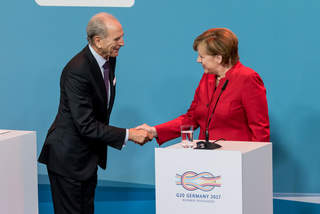
B20 President Jürgen Heraeus with German Chancellor Angela Merkel © Christian Kruppa
The German G20 Presidency: An Evaluation by B20 Germany
The aim of the B20 Germany process was the development of actionable and detailed policy recommendations that will lead to a sustainable, future-oriented world economy. B20 adopted policy recommendations regarding nine focal areas: Trade and Investment, Energy, Climate and Resource Efficiency, Financing Growth and Infrastructure, Digitalization, Employment and Education, Responsible Business Conduct and Anti-Corruption, SMEs, Health and the Compact with Africa. On 3 May, B20 Germany presented the recommendations to German Chancellor and G20 Chair Angela Merkel. Over the past months, the B20 Germany Team analysed the responsiveness of the G20 to the B20 recommendations. To that end, the team evaluated the G20 Leaders’ Declaration and its related annexes. Overall, the business priorities are reflected in the declaration of G20 Leaders. However, the declaration often only secures the status quo, rather than advancing the respective topics.
Strong Commitment on Financing Growth and Infrastructure
The TF Financing Growth and Infrastructure had a significant impact on the work of the G20, raising awareness on a wide range of important topics for the business community. B20 rated the responsiveness of the G20 on financing growth and infrastructure as very good. Employment and Education was another focal topic that was solidly reflected in the Leaders’ Declaration, particularly the recommendation on harnessing the potential of technological change.
Mixed Results on Energy, Climate and Resource Efficiency
The recommendations on Energy, Climate and Resource Efficiency were adequately reflected. Within this focal area, resource efficiency was clearly the topic in which the G20 reached a more extensive agreement. It is disappointing that the G20 did not deliver a joint message on climate protection and did not present mechanisms on carbon pricing. However, B20 positively notes the commitment of the remaining 19 G20 members to implement the Paris Climate Agreement.
Trade and Investment Did Not Meet Expectations
Unfortunately, the G20 responsiveness towards B20 Recommendations regarding Trade and Investment, Digitalization, Responsible Business Conduct and Anti-Corruption, and the Compact with Africa was only satisfactory. In particular, responsible business conduct in infrastructure projects as well as artificial intelligence were not sufficiently reflected. The G20 agreements on trade and investment did not meet the expectations. Specifically, the issue of investment facilitation received comparatively little attention in the final G20 documents. Building on the Hangzhou Declaration, B20 had hoped for a clear commitment by G20 members to implement the G20 Guiding Principles for Global Investment Policymaking and a roadmap with more concrete actions. Digital trade is referenced across a wide range of G20 documents. Within the Leaders’ Declaration, however, the documents come up relatively short on specific policy guidance.
The B20 recommendations on SMEs and Health have been least reflected in the G20 Leaders’ Declaration. Disappointingly, SMEs received less attention during the German G20 Presidency than in prior G20 cycles. Digital capacities and financial inclusion were partly reflected; however, the integration of SMEs into cross-border trade went unmentioned. B20 Germany was the first B20 Presidency adopting recommendations on health. While the recommendation to combat antimicrobial resistance was well integrated, several other topics such as digital health and innovation in health care did not receive attention by the G20 leaders.



